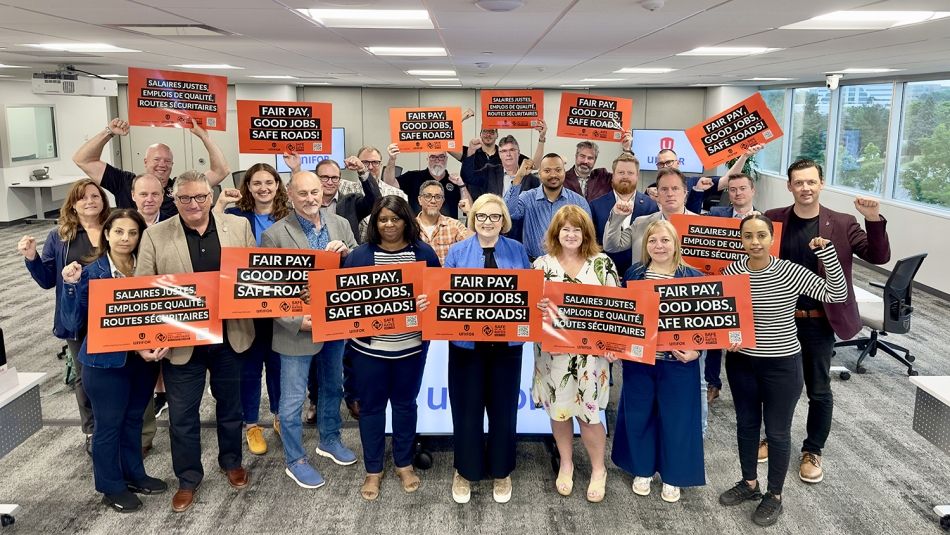
Share
A meeting of the International Transport Workers’ Federation (ITF) Canada National Coordinating Committee meeting took place on June 26, 2025, in Toronto, with defending the right to strike and the U.S. trade war front-and-centre on the agenda.
“Workers should not have to pay the price for the trade war initiated by the United States – and corporations should not exploit the moment we’re in, " said Unifor National President Lana Payne.
"That means pushing back hard: at bargaining tables, in trade discussions, and everywhere our collective rights are threatened throughout the country."
In her report, Payne told the committee she was looking forward to hearing feedback about how tariffs and supply chain interruption are impacting the transport sector.
Payne, who co-chairs the ITF Canada NCC along with Teamsters Canada President François Laporte, spoke about how Unifor tenaciously recently fought against DHL Express Canada's anti-scab legislation exemption request to the federal government.
"It forced the company to realize in this instance it had to get to the bargaining table and bargain a fair collective agreement,” she said.
The committee issued a statement, “Working together to defend the right to strike in Canada and across the world.”
ITF affiliates and sector representatives from Unifor, Teamsters Canada, SIU Canada, NUPGE, ALPA, CATCA, ILWU, CUPW, and BCFMWU, provided updates, and discussed current issues and shared priorities.
Unifor National Secretary-Treasurer Len Poirier highlighted the importance of Unifor supporting the ITF’s Safe Rates campaign, which wrapped up that week.
“It was a way for us to really leverage our members, whether in transit, road transport, trucking, long-haul, short-haul, LTL freight or couriers, and Brinks armoured cars, so each of our groups were able to latch on and have a part in the campaign. It was very important,” he said. “We can all agree that self-regulation never works.”
Unifor Atlantic Regional Director Jennifer Murray reported on a planned work program – which will include the ITF’s “The 8 Principles for Decent Work,” the world’s first program outlining global standards for decent work in warehousing, distribution, and logistics, This groundbreaking framework marks a major step forward in raising the floor for millions of workers across global supply chains.
Murray, who sits as vice-chair of the ITF’s Women’s Committee, attended the launch of the program during the ITF’s warehousing meeting in Belgium in May.
This new framework will serve as an important tool for Unifor’s ongoing efforts to improve working conditions in the warehousing sector and intersects with the union’s work in road transport and supply chains.
The ITF is also prioritizing work around intimate partner violence (IPV), Murray told the committee, which parallels the significant work Unifor has undertaken to have IPV declared an epidemic in all provinces and territories.
“Domestic violence becomes a workplace issue and a union issue because when we go to work, we bring our home life with us,” she said.
“We talked about in Canada, how we lobbied for five paid days of domestic violence leave and secondly, Unifor has been advocating for each province to declare IPV an epidemic. We’ve been successful so far in Nova Scotia and have made progress in New Brunswick and Nova Scotia, Saskatchewan, Alberta and Newfoundland and Labrador, but we’re not there yet.”
“With other affiliates, we’re really talking about strengthening our organizing efforts, tackling inequality and working conditions for workers across sectors,” said Unifor Ontario Regional Director Samia Hashi, who sits on the ITF Tourism Committee, which protects working conditions for those in that industry.
The International Transport Workers’ Federation is a democratic, affiliate-led federation recognised as the world’s leading transport authority. They fight passionately to improve workers' lives, connecting more than 700 affiliated trade unions from 150 countries to secure rights, equality and justice for workers' globally.
Unifor represents 320,000 members across every sector of the economy, including members working in road, air, marine, and rail transportation.


